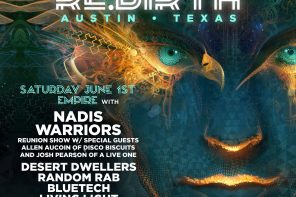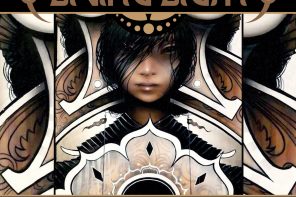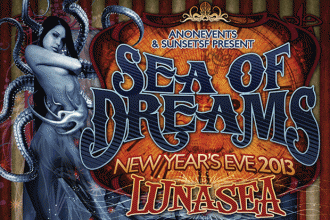Ranchsauce (LiS): In a June 2009 Jambase article, you (David Phipps) said to Jason Turgeon “But now the pendulum’s swinging, [and] we find ourselves playing acoustic guitar and a real piano and trying to write some really beautiful progressions and melodies that are just really strong [and] timeless.” Where would you say that pendulum is positioned today?
David Phipps (Keyboardist of STS9): Still swinging, more laid back, and forth. We’re fully inspired to do work on these acoustic shows and anything involved with acoustic shows. We are also getting a lot done in the studio. We do a lot of work with modular synthesizers right now, and with the small community of guys in their workshops making recreations of classic synth elements that are sold in small batches. Short, local kind of stuff. It’s a great community with fun stuff going on. There is a wall of synths with patch cables coming in and out of different modules. It doesn’t sound like anything else, hugely electronic and really inspiring. I also have an upright piano at home that I practice on. It depends on the day and the hour and which way we are leaning right now.
Ranch: STS9 recently wrote the score for a new documentary, ReGeneration. The film discusses how the apathy found in today’s generation leads to exploration of technology, our disconnection with nature, how much we consume, our loss of history, and the economic factors holding many of us back from becoming more active participants in our communities. In what ways does your band connect with the ReGeneration concepts?
Phipps: The documentary is a journey that covers many different angles, and we’ve been working on this for many years now. It has grown to be so much more elaborate and authoritative, with the the film’s speakers who put things more eloquently than we ever could. We are so fortunate to be in such good company with such prominent intellectuals (Howard Zinn, Noam Chomsky, Talib Kweli). As far as when we first started, we were really thinking ‘what could we talk about to inspire a teenager, or 12 year old, 13 year old to just… be inspired by these different acts that might be before them, and what’s expected of them and what inspires them.’ And we just kind of started from there. We’re really lucky, and thankful, to be an example of a group of guys who were able to kind of chart our own destiny, and break away from society’s norms of working and that kind of stuff. We’re just very blessed to be able to do what we do, and to be hopeful that that in itself inspires someone to take a chance, no matter how risky or scary it might seem to volunteer or take action.
STS9: DIY from Phillip Montgomery on Vimeo
ReGENERATION Trailer from Phillip Montgomery on Vimeo
Ranch: Do you have any idea when the public will be able to view the film?
Phipps: We’re not really sure. We’re just making the rounds with film festivals right now. The reception has been really good, and from there I don’t know if it will be shown in theaters. We’re not really sure how that works (laughs). But hopefully by the late fall we will be doing some showings. Even if it is the kind of thing we do in conjunction with concerts, or anywhere we get to show the film- maybe even just high school events. In Seattle, the film was shown at a festival and then the next morning they showed it to an auditorium full of high school kids. In the post-showing there were lines of students longer than the time allowed at the microphones to ask questions and give reactions. There was a standing ovation after the film, and that was even more a gauge of success than the golf clap at a film festival. We actually made it for high school kids, and it is used for participation in the situation of apathy and activism.

STS9 will soon break ground on a sustainable home in the Lower 9th Ward
Ranch: Due largely to the sales of your release “Peaceblaster : The Make it Right Remixes,” STS9 has raised $150,000 to build a new home in New Orleans’ 9th Ward for the Make it Right Foundation. What motivates your band to participate in such humanitarian efforts?
Phipps: If you came to see Sector 9 in 2009 , you donated a dollar to help. You know, we give a lot of credit to the album, but the vast majority of the funds came from these shows. As far as our humanitarian efforts and activism, we will always help. In the past we’ve kind of split it up into three local Santa Cruz charities, a national North American charity and an international charity. That was the mission before. It was very effective, and we felt good about that. My brother is a high school teacher in South Florida and we support his high school’s solar race car team. They race in a national race each year, and they won first last year and second this year. It’s a really fun project.
When we went to New Orleans for a show and got a tour of the 9th ward, from that personal experience we decided to just funnel everything into one project a year. The ongoing charities conjoined, and we tried to consolidate into one inexplicable fund to make real change. We were invited into a FEMA trailer and got a first hand account, and it touched us. We were very moved by that and we said that we could do something about this through our motivation. Took a couple more months, then a year, to reach our goal, and we are pretty excited. Now we’re trying to figure out what we can do thats even better than that, to raise the bar. We’re looking out for what the next big efforts are going to be and what we can do now.
Ranch: You describe the goal of your label 1320 Records as “bringing the music to the people in the most conscious and efficient way possible. Thus lessening the distance between artists and fans.” Can you elaborate on how this goal has become a reality?
Phipps: It all started out of necessity. Being somewhat of a successful touring band, we had an audience and needed a place to release music. But there wasn’t really a major record label, or even a smaller record label, that could get on the same page as us. We had a couple of flings, if you will, that really didn’t work out. And then our album was ready, so we started our own record label to take care of it ourselves. We gradually realized the same kind of situation exists for other artists. We thought that hopefully, we could be a place to keep known artists on schedule and be able to make music how they want to. To give them a homebase to share what we’ve learned over 13 years now, with other people that are coming along the same path as us. It’s working out great. One of my favorite artists, Big Gigantic, have been with us on tour for the last couple of weeks as after party or opening gigs. Big G are an example of independent artists working themselves up in a grassroots kind of way through real music lovers. There’s not a lot of hype or marketing behind them, the music that they play, or people’s reaction to it. That‘s the kind of group and musicians that we like to support, share our markets with, and get on their way to receiving the recognition that they are working really hard for. Hopefully the Sector guys, with our touring experience, have some advice to offer. Some opening spots, after parties, whatever we can do to get these guys a crowd of people.
Ranch: “Heavy” was the second song of your encore last week in Boston. I had never heard it played live before. How do you incorporate tracks off of your newest album, Ad Explorata, into your shows?
Phipps: Ad Explorata is taking longer to incorporate into our live show. Its a no holds barred studio project. In almost every song on Ad Explorata, there are four or five keyboard parts going on. Some parts played by Hunter Brown are layers and layers of modular synthesizer stuff. Its taking us a little bit longer to break that down into something just the five of us can do, without it being a complete play along to a recording. In general, with the studio recordings, we try to break them down as we render stuff out of the recordings to configure live. Leave out parts that just kind of cant be played, string it together and see how far we can go. Our favorite song off of that is “Oil and Water” and we’ve been working on that in sound check, trying to get it ready for the stage. That one is coming soon.
Ranch: I have always had faith in your ability as a band to power through entire shows without interruption. In the past 12 years, you may have played more near flawless shows than any other touring band. Can you describe a successful STS9 show?
Phipps: It’s really hard because with a lot of the shows, when we come off stage, its like we just lost a game or something. For some of our fans, its like they are seeing tension and real human activity on stage and they see it as the best show ever. And sometimes we re-vamp old songs or work on new songs to debut and we think we just killed it. But some fans are disappointed because it wasn’t the old version of the song they were expecting and they wanted an old song instead of a new song, so it’s really hard to get that right. We are either full on high fiving or there is maybe not so much eye contact going on between us. But a great show to me is one where there is a connection made. We really react from the audience a lot. And its different, regionally, just how excited different audiences get. A San Francisco crowd is a lot different from an Atlanta, Georgia crowd. All that kind of adds up together to be like did they get it? Did we play over their heads? Generally, to me, its just a gift to be able to do this every night; it cracks me up every night. My work day is just to get on stage and rage it, I couldn’t ask for a better job. No matter if we tank or we kill it, its a good time and there is always the next show.
Ranch: Many music fans believe that they can simply examine a show’s set list and make a call on whether or not it was up to par. Why do you think some fans want to believe that some shows are only as good as their set lists?
Phipps: I think its somewhat built into our culture, the jam band culture. We try to do our best to mix it up, but i do feel like there is enough openness to our songs. Especially in this last year, we have tried to concentrate on revamping some old songs and writing new parts in the middle of songs that are ten years old or more. If you see the song title on the set list, and you weren’t at that show, that doesn’t mean that you know what happened. We could play the same tracks every night and it’s not going to be the same show. I like the old stuff, I like how we grew. I like a little bit of mystery of what’s going to happen next. Writing what we feel are the best parts and nailing the parts that we are supposed to nail. Kind of take some pride in the musicianship and songwriting. In ’99 we had nine songs, we played all nine songs every night. The shows were three hours long and they were never the same. And parts of that are really awesome. We try to find a balance of compositions and new parts to still make some magic happen and play improv. We don’t want it to get to the point where its like a Broadway musical.
Ranch: What keeps you motivated to keep it moving both on stage and on the road?
Phipps: Hunter and I were talking about this the other day. We just don’t want to ever be the kind of band that calls it their cattle work: “that’s the songs we play, and that’s Sector 9.” Twelve, thirteen years into it, and we still feel like we have a lot of time and a lot more to write musically. That, and my growling stomach, that’s what motivates me (laughs). We just love making music, and I guess the difference is that we don’t feel like our catalog is complete, that we can be this band that just plays “Moonsocket” for the next ten years. There is a lot more music to be had. We have a great studio in Santa Cruz, a great work space, and that keeps us motivated. We are going to start working on another album this fall.
Ranch: What musicians are in your playlist right now?
Phipps: Listening to Grizzly Bear, XX, Alice Coltrane, Harmonic 313 and John Hughes– especially his new album on 1320, Reset the Warehouse.





